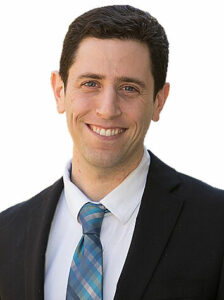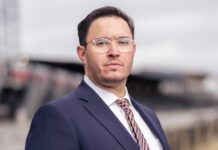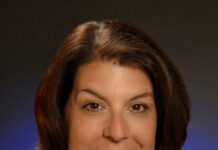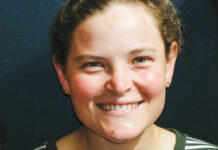As an acupuncturist and integrative medicine provider, Doron Ben-Dov hopes his work makes people feel better both physically and spiritually.

Ben-Dov, 43, works at the Baltimore Pain Management Center as a partner, and he combines his knowledge of holistic medicine and the Kabbalah for a truly unique experience.
So it follows that he also had a unique upbringing. Ben-Dov, who currently lives in Baltimore with his wife and three children and attends Beth Tfiloh Congregation, was born in Israel to Orthodox parents. At the age of 5, his family moved to Johannesburg in South Africa because of his father’s career as an aircraft engineer. Five years later, his family returned to Israel. His family later moved again to Montreal, Canada. Ben-Dov eventually moved to the U.S. on his own, and he relocated to Baltimore to be closer to his wife’s extended family.
“I have a different lens than someone who only lives in the same place would, because you see different cultures and every culture has its own unique customs,” Ben-Dov said of his childhood. “What’s interesting in regards to Judaism is that it always stays the same, which is very comforting. No matter where you go, you’ll find the same prayers.”
Ben-Dov always had an interest in medicine. In his 20s, after graduating from college, he found himself uncertain about his religious identity and career path. It was at this time that he began studying Kabbalah — the practice of interpreting the Torah through a more mystical lens.
Around the same time in his life, he became interested in holistic medicine because of its more spiritual aspects.
“[Holistic medicine] appealed to me because it looks at the patient as a whole, rather than as a fragmented entity,” Ben-Dov explained. “In my 20s, I saw the incredible advantages offered by technology in Western medicine, but I saw the disadvantage of looking at patients in a fragmented way, focusing on specific body parts and specializations.”
Ben-Dov’s work is heavily influenced by his mentor. He studied under the late Raphael Mechulam, a Jewish organic chemist commonly known as “the godfather of cannabis research” for his efforts to use cannabis derivatives to treat pain.
Much of Ben-Dov’s work focuses on treating pain and inflammatory conditions, such as fibromyalgia, neuropathy and sciatica. He is currently conducting research about these topics at LifeBridge Health.
“The holistic view of these conditions is looking at how to regulate the body to function optimally, with the condition that the [medical] condition is still there,” he said. “The tools I use are not curing the disease, but strengthening the patient’s immunity.”
Acupuncture is often used to treat pain, with the Mayo Clinic noting that many Western practitioners of it use it to stimulate different parts of the body. Ben-Dov stated that the idea of his work is that acupuncture gives patients with inflammatory conditions more energy and vitality to combat those conditions.
Rather than attempting to cure his patients, his goal is to help them function with their medical difficulties. Ben-Dov ties this into the ideas presented by Kabbalah because both the philosophy and his work involve looking at things as a whole and how different, seemingly unrelated ideas can fit together.
“The understanding of Kabbalah is an additional tool on how to view and treat patients,” he said. “Each patient is much more than the sum of their presenting symptoms. Each one has a unique story that informs their current physical and emotional situation.”
Ben-Dov said he believes that science cannot fully be divorced from spirituality. Only looking at patients from a biological standpoint and not taking their lifestyles or personal needs into account provides an incomplete picture of them, in his opinion.
“A person is not just chemicals and neurotransmitters,” he said. “You can reduce a person’s emotions to those things from a biological standpoint, but a patient is so much more than that. From a Jewish perspective, we are so much more than different objective parts all put together.”
Ben-Dov is most proud of how he communicates with patients, calling bedside manner a “lost art” in medicine.
“It can be easy to lose yourself in the medical system today,” he said. “So far I’ve been able to, and hopefully will continue to, innovate and really work with each patient, listen to their story and try my best to help them. I can’t always help them fully. But I’m always present with them.”







